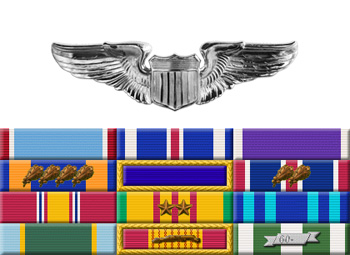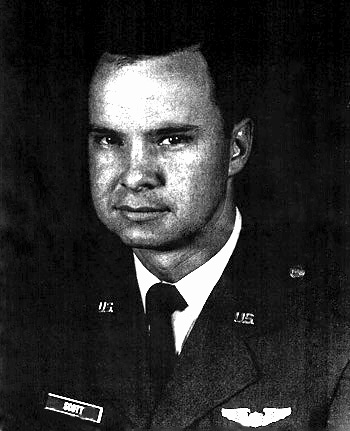Travis Scott was born on April 29, 1943, in Montgomery, Alabama. He was commissioned a 2nd Lt in the U.S. Air Force through the Air Force ROTC program on May 30, 1965, and went on active duty beginning October 17, 1965. Lt Scott completed Undergraduate Pilot Training and was awarded his pilot wings at Craig AFB, Alabama, in November 1966, followed by C-141 Starlifter transition training before serving as a C-141 pilot with the 76th Military Airlift Squadron at Charleston AFB, South Carolina, from January 1967 to December 1968. He then completed Helicopter Conversion Pilot training in April 1969 and HH-3E Jolly Green Giant transition training in June 1969. Capt Scott's final assignment was as an HH-3E pilot with the 37th Aerospace Rescue and Recovery Squadron at DaNang AB, South Vietnam, from July 1969 until he was killed in action on April 15, 1970.
His Air Force Cross Citation reads:
The President of the United States of America, authorized by Section 8742, Title 10, United States Code, awards the Air Force Cross to Captain Travis H. Scott, Jr., for extraordinary heroism in military operations against an opposing armed force as Aircraft Commander of an HH-3E helicopter near Dak Nay Puey, Republic of Vietnam, on 15 April 1970. On that date, Captain Scott was engaged in the rescue of a crew of a United States Army helicopter which was shot down by enemy ground fire. With display of great skill and professional airmanship, Captain Scott made two earlier attempts to position his helicopter, but each time he was driven off by heavy ground fire, which inflicted damage to his helicopter. After assessing the damage to his helicopter, and assuring that his crew was able to continue with the mission, Captain Scott requested and received permission to make a third rescue attempt. In this attempts, the helicopter was severely damaged by an intense burst of heavy automatic weapons fire. Captain Scott heroically struggled to keep his crippled helicopter airborne and, with sheer determination and a deep concern for his fellowmen, he crash landed his helicopter in order to save the lives of his crew and passengers. Through his extraordinary heroism, superb airmanship and aggressiveness in the face of an opposing armed force, and in the dedication of his service to his country, Captain Scott reflected the highest credit upon himself and the United States Air Force.
|



